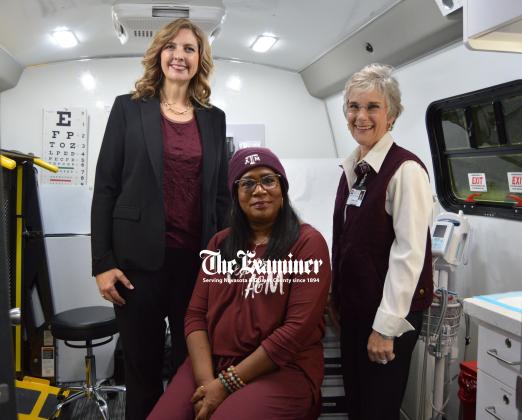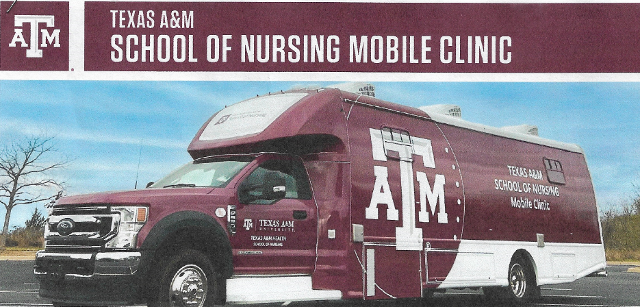School of Nursing mobile clinic, on the road to health care access
Putting patients first and meeting health care needs in the underserved rural areas of the Brazos Valley is the mission and passion of a dedicated team of Nurse Practitioners, Registered Nurses and Clinical Health Workers.
Thanks to a $4 million Health Resources and Services Administration (HRSA) grant, the Texas A&M University (TAMU) School of Nursing Mobile Clinic and its partnerships with area school districts is improving lives in the Brazos Valley.
School partners
The Mobile Clinic was a grant project of TAMU Health Science Center former Associate Professor Dr. Cindy Weston that focused on increasing access to care. The Mobile Clinic, now up and running, is in its second year of a four year grant and makes weekly visits to six locations in five counties. Determining locations involved using Health Professional Shortage Areas (HPSA) data — areas where there are not enough providers for the amount of population.
Family Nurse Practitioner and Associate Dean for Clinical and Outreach Affairs for the School of Nursing Nicole Kroll said, “She (Weston) sent out letters to all the school districts we thought would be interested in a school-based mobile health clinic and the ones that responded are the ones we come to.”
The Aggie-maroon clinic on wheels can be found in Brenham Monday and at Leon ISD Tuesday. On Wednesday, patients are urged to confirm the time with the school district as the mobile clinic serves both Burton ISD and Round Top/Carmine Elementary that day. It’s stationed in Iola ISD Thursday and Hearne ISD Friday.
In addition to Kroll, the Mobile Clinic team consists of Family Nurse Practitioners Elizabeth Ellis and Ali Wurster, Registered Nurses Tally Priesmeyer and Jennifer Priestly and Clinical Health Workers Kylee Schaeffer and Yeci Rivera. On the administrative side are Patient Services Manager Sara Clark, Associate Program Director Dennis LaCaze and Medical Director, Dr. Robert Carpenter.
A less “mobile” member of the School of Nursing team is Nurse Practitioner Charlotte Toney. Located in the School of Nursing’s walk-in clinic at the TAMU Health Hub in Navasota, Toney sees a lot of urgent and chronic care patients and works collaboratively with the Mobile Clinic and TAMU School of Medicine.
Covering the gamut
Mobility doesn’t limit the clinic’s ability to provide full primary care.
Ellis said, “Everything from urgent care — colds, flu, sore throats, abdominal pain, back pain to being your primary care provider managing high blood pressure and diabetes. We do well-child physicals and screening examinations for Medicaid children, annual wellness visits for geriatrics on Medicare and comprehensive chronic pain management. Minor injuries — suturing and foreign body removal, emergency hydration to give somebody IV fluids. Just like any primary care clinic, we cover the gamut.”
She continued, “Our goal is rolling out telehealth and home health services for those patients who physically can’t get to us.”
The Mobile Clinic performs TxDOT and HeadStart physicals and provides translator services for 30-plus languages.
For the host schools, it provides bus driver and student sports physicals and is available to assist the faculty if they’re suddenly ill or need a flu shot on their break.
Addressing health records security, Ellis said, “The internet on the van is not linked to anywhere else. It keeps all of our electronic health records confidential.”
Expansion challenges
According to Kroll, to add locations the School of Nursing will have to obtain another grant or become self-sustaining through patient and insurance payments and philanthropic contributions. Another factor is obtaining Rural Health Clinic certification. At present reimbursement is minimal.
Ellis said, “The government realizes that serving the underserved areas is expensive so they give us a higher rate to try to do that for Medicare visits and an all-inclusive payment rate for Medicaid children. It makes a difference.”
The Mobile Clinic is a certified Texas Vaccine For Children Program provider for uninsured, underinsured or Medicaid children. While they would pay out of pocket at a regular clinic, the Mobile Clinic administers vaccines provided by the state. Staff are also seeking Adult Safety Net qualification to provide vaccines for uninsured and underinsured adults.
As for a patient’s cost, Kroll said, “Depending on where they fall on the scale from A-E, they can get 60% off. A $15 copay is the lowest. Covering all of your visit for $15 is pretty nice.”
Patient’s first!
Reflecting on post-COVID fallout such as providers leaving the profession, informed consent and a loss of trust in the health care system, Ellis said, “We don’t force any vaccine. That’s the individual’s decision.”
Staff are required to advise their patients about vaccine side effects and provide them a Vaccine Information Statement.
She also sees signs that the Mobile Clinic is a bridge to restoring trust.
She said, “I think that’s an aspect of being a nurse first and foremost. In addition to being a nurse practitioner, we’re in a role to carefully assess the patient and their needs and wants, discuss that with them and give them the informed ability to make that decision, and work with that patient.”
Kroll said, “I think you will see a difference between how a nurse is trained versus how a physician is trained. That’s why nurse practitioners are a lot of times out in the rural communities, we’re drawn to those areas because we know we can make a difference. Patients are first. It’s not about numbers or how many people we can run through this clinic. We’re looking for quality care. We’re looking to help communities, to decrease the gap and ease access.”
She continued, “We’re also in the schools with our nurse and we’re teaching young kids K-12 about what it’s like to be in the health profession. I mean, how exciting is that to see that we come to their school and they could do this one day!”
For Mobile Clinic information, go to https://nursing.tamu.edu/clinical/mobile-clinic.html.


